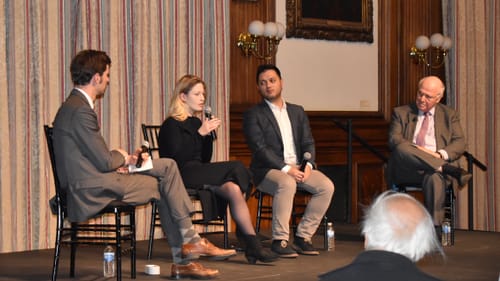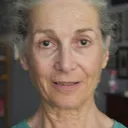Stay in the Loop
BSR publishes on a weekly schedule, with an email newsletter every Wednesday and Thursday morning. There’s no paywall, and subscribing is always free.
Where art song reigns
PCMS presents Emerging Voices: Art Song and Social Connection

The Philadelphia Chamber Music Society (PCMS), which presents fine musicians playing traditional repertoire of classical chamber music, enlisted tenor Nicholas Phan to develop and coordinate a mold-breaking two-week gathering of musicians, scholars, historians, poets, and composers to discuss national identity, social impact, and historical reflection in the music just before and after World War I. Phan's program, Emerging Voices: Art Song and Social Connection, is a hit in Philly.
The range of music and ideas is so compelling and intriguing that when I showed the program to a young rising-star opera composer at the Prototype new opera festival in New York, he exclaimed, “I’m coming to Philadelphia!” He is not the only one. Many singers in the area flocked to the concert on January 17 at the Kimmel Center, exclaiming that after they heard how good the January 14 concert had been, they dropped everything to attend the next. They were rewarded by Roderick Williams’s amazing ability to render Ivor Gurney’s nostalgia for England as he fought in the trenches of France.
Faithful music
The musicians, including Phan, not only were consummate artists, but also took the task of steeping themselves in the language, text, and historical context extremely seriously. Pianists Shannon McGinnis and Myra Huang mastered a compilation of songs by composers who put to music the various voices of upheaval as new countries emerged from the chaotic aftermath of World War I.
Presented composers included Béla Bartók and Zoltan Kodály. They recorded songs sung by peasants and farmers who represented the various cultures of Eastern Europe, cultures that reflected not the urban elite, but the farmer and rural dweller. They published a collection of these songs after digging down to the original and purest form of the folksongs and then building simple accompaniments for their performance. Dr. Lili Kass, one of the preconcert lecturers, played a recording Bartók made of a farmer singing a folksong, followed by a performance of Bartók’s startlingly similar arrangement, proving the composer's faithfulness to the original.
I was sitting by two Czech visitors and witnessed them become absolutely mesmerized by The Diary of One Who Disappeared by Leoš Janáček, the story of a young farmer who falls in love with the Romany temptress he sees in the wood by his field. Phan sang the naïve farmer whose sexual awakening makes him choose between his mother’s aspirations and love. Jennifer Johnson Cano sang the beguiling woman, and at one point in the performance things got so hot it seemed we might have to stop the concert. Fortunately, decorum was maintained. Still, my Czech neighbors were bristling with excitement at the end of the piece.
A heart in Doylestown
Phan also organized revelatory lectures before each Perelman concert. Tidbits shared included the fact that the famous pianist and composer Ignacy Jan Paderewski, who interrupted his brilliant piano performance career to step in as prime minister of Poland and secure its place in the Treaty of Versailles in 1919, left his heart (literally) in Doylestown, Pennsylvania. Sarah Shafer performed Paderewski’s Six Songs, Opus 18 (1893) in Polish accompanied by McGinnis on piano. Not only was the music superb, but also it is impressive that McGinnis and Huang managed to follow texts in Spanish, French, Polish, Czech, Hungarian, and English.
Projection problems
The English texts of the poems were projected behind the performers on a large screen. According to PCMS artistic director Miles Cohen, this was to prevent the audience from flipping through printed translations, looking between the performers and texts, but the noble attempt went awry. The translations were mostly convincing, but not always, with phrases like “beater years” and misspellings and some rather enigmatic sentences from the translations of the Hungarian and Czech poems.
Behind the words, projection designer Hana Sooyeon Kim created illustrations designed to match the text. The oozing roses, plough furrows, and melting impressionistic paintings seemed cartoonish, and their incessant movement and metamorphoses were distracting and often obscured the text. The idea of projecting the texts is a good one, but it would be more effective to project the originals on the left and the English translations (when needed) on the right. This would have allowed the audience to concentrate on the performers more than the dizzying projections.

Musical silence
The first panel discussion of Emerging Voices, at the College of Physicians on January 13, was slightly marred by malfunctioning microphones, but speakers Phan, Ceri Owens (pianist and historian), and Jay Winter (historian) brought thought-provoking ideas about how song provides a vehicle for expression of emotion and social upheaval. PCMS education director Erik Petersons bravely moderated through a series of bum microphones. Winter, a Yale professor whose parents survived the Holocaust, emphasized that silence is also a part of musical expression. Owens and Phan also noted the importance of silence as part of performance—the pause to allow the audience to react.
New work, new perspectives
The series includes four newly commissioned works from Nicholas Bacri (France), Errollyn Wallen (United Kingdom), Iva Bittová (Czech Republic), and Nico Muhly (United States). While these diverse poets, composers, and musicians developed text and themes relevant to their nations, their music transcends cultural borders and evokes issues common to all.
Nadia Boulanger, whose compositions were represented in several of the concerts, spent most of her life teaching and performing. She opened her French Music School for Americans in Fontainebleau in the summer of 1921 and trained many American composers, including Aaron Copland, Elliott Carter, Irving Fine, Philip Glass, Roy Harris, Quincy Jones, and Virgil Thomson. She taught them to find their own personal voice, and in doing so helped each of them create meaningful contributions to the wildly patterned quilt of American music.
This tour de force by Phan and the PCMS provides a shot of adrenaline to the Philadelphia chamber music scene, attracting a more diverse audience to discover art songs and the picture they paint of history and social change.
What, When, Where
Emerging Voices: Art Song and Social Connection, presented by the Philadelphia Chamber Music Society January 13 through 24, 2020. Emerging Voices offers concerts at the Kimmel’s Perelman Theatre (300 South Broad St., Philadelphia) on January 14, 17, 19, and 24; and salon concerts at Stotesbury Mansion (1923 Walnut St., Philadelphia) on January 15 and 22. There were panel discussions at the College of Physicians (19 South 22nd St., Philadelphia) January 13 and 20. For more info and the full lineup, call (215) 569-8080 or visit pcmsconcerts.org.
Sign up for our newsletter
All of the week's new articles, all in one place. Sign up for the free weekly BSR newsletters, and don't miss a conversation.

 Margaret Darby
Margaret Darby